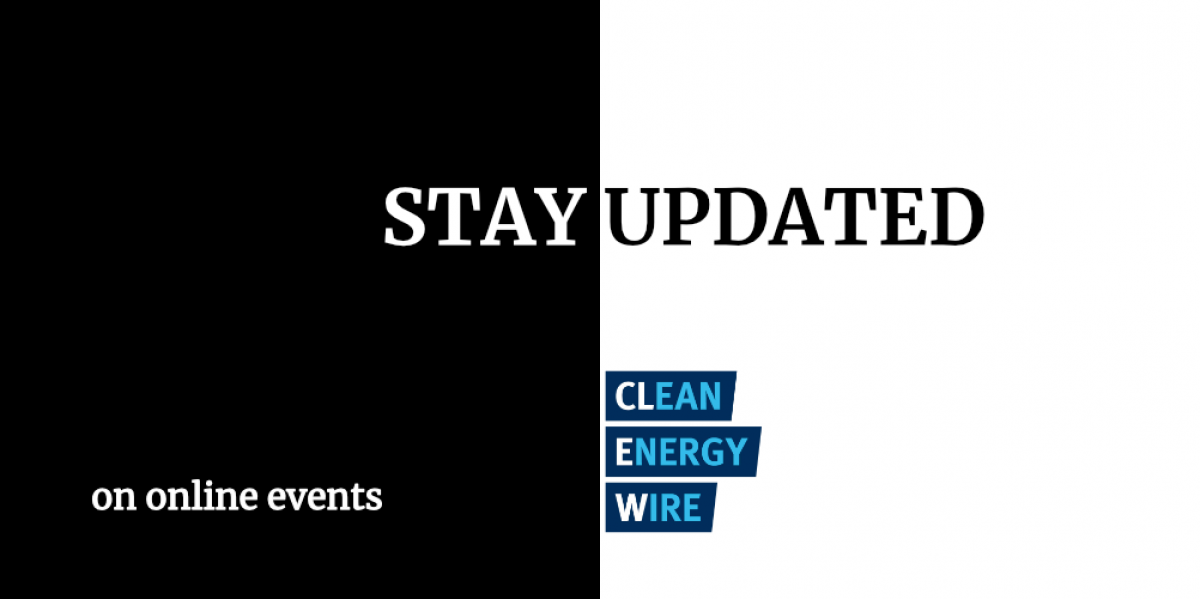Stay updated on online journalism and energy events
LAST UPDATE 05/06
[Updated with webinars from Agora Energiewende, WRI, ERCST]
|
02/07, 14.00 CEST |
Webinar - Fostering interoperability across borders: the case of energy consumer data Organiser: Florence School of Regulation (FSR) The management of energy consumer data varies across EU Member States. This heterogeneity of the solutions adopted can act as a barrier to market entry, particularly for companies seeking to offer innovative, data-driven energy services. Commission Implementing Regulation (EU) 2023/1162— the first of the implementing acts foreseen by Article 24 of the Electricity Directive 2019/944— requires Member States to facilitate the interoperability of energy services within the Union. It introduces a Reference Model for access to metering and consumption data and obliges Member States to report their national practices to the European Commission by 5 July 2025. The information collected will be published in a repository jointly maintained by ENTSO-E and the EU DSO Entity. This approach aims to foster interoperability across borders without mandating a single data management model. As the reporting deadline approaches, the Florence School of Regulation (FSR) is organising an online debate to reflect on the current landscape of consumer data management in Europe and the EU’s approach to interoperability. A recent FSR policy brief will be presented during the event, followed by a discussion with key stakeholders. You can find more information here and register via this link. |
|
02/07, 15.00 CEST |
Webinar - Financing and Scaling Net-Zero Carbon and Resilient Buildings Organiser: World Resources Institute (WRI) Buildings account for nearly 40% of global energy consumption and a third of greenhouse gas (GHG) emissions. Yet, climate finance for decarbonizing the sector remains limited, hindered by fragmented markets, long payback periods and a lack of scalable investment models. Hosted by WRI's All in for a Net Zero Built Environment initiative, this webinar will convene public and private sector leaders to explore practical strategies for accelerating financing and scaling net-zero carbon and resilient buildings. The webinar will bring together key public and private stakeholders, including financing institutions and companies committed to building decarbonization, to explore their strategies for accelerating the transition to net-zero carbon and resilient buildings (NZCRBs). The session will give speakers opportunities to: 1) Discuss existing opportunities and challenges in financing and scaling up NZCRBs; 2) Showcase innovative financing and business models that are used for scalable NZCRBs; and 3) Foster cross-sector collaboration to accelerate the market transformation and scaling up NZCRBs. This webinar will provide space for a diverse array of speakers to share insights on current progress, barriers and opportunities as well as innovative business models and financial instruments they're using to advance NZCRBs. Speaker presentations will be followed by a Q&A session, offering participants an opportunity for an interactive dialogue with practitioners. You can find more information and register via this link. |
|
02/07, 15.00 CEST |
Webinar - China energy transition and climate status in numbers Organiser: Agora Energiewende Accounting for around one third of global carbon emissions, China plays a significant role in shaping the trajectory of global climate action. In 2024, China was responsible for more than half of the world’s increase in wind and solar capacity, demonstrating its central role in advancing the global commitment to triple global renewable energy capacity by 2030. This event marks the launch of a new slide deck, providing a detailed and data-driven analysis of China’s 2024/2025 energy and climate developments. The deck delivers key insights on emission trends and intensity, shifts in energy consumption and supply structure, sector-specific transformations, emerging trade-offs and policy signals and much more. By unpacking the numbers behind China’s energy transition and climate change, this analysis helps build a clearer picture of the country’s progress, the challenges ahead and the opportunities for impactful action – both at home and on the global stage. Co-hosted by Agora Energy China and Agora Energiewende, this event brings together leading experts to walk through the key findings, explore their implications and discuss how data, transparency and collaboration can accelerate the transition to a low-carbon future. You can find more information here and register via this link. |
|
03/07, 14.00 CEST |
Webinar - Advancing the Transition Away from Fossil Fuels in Third Generation National Climate Plans Organiser: The International Institute for Sustainable Development (IISD) With only 9 months left before the 2025 United Nations Climate Change Conference (COP 30), there is an urgent need for countries to deliver ambitious nationally determined contributions (NDCs) that implement the global stocktake outcome, including transitioning away from fossil fuels. However, research from the International Institute for Sustainable Development shows that past NDCs have largely not addressed transitioning away from fossil fuel production, raising the question of how this matter can be included in future NDCs. Meanwhile, since COP 28, there have been significant changes in the global context of the clean energy transition. United States President Donald Trump has pledged to “drill, baby, drill,” and his tariffs have important implications for clean energy supply chains. In Europe, we have seen some retrenchment of the clean energy transition. However, it remains critical for the Global North to take the lead in the transition away from fossil fuels. In this changing context, this webinar will provide recommendations for strong implementation of the global stocktake outcome in NDCs. Panellists from governments and international organizations will share their experiences and views on implementing the transition away from fossil fuels via third-generation NDCs, including how to make these plans fundable, and will reflect on how NDCs can facilitate a clean and just energy transition in emerging and developing economies. Panellists will also share what they expect to be contained in NDCs to be delivered by COP 30. You can find more information here and register via this link. |
|
08/07, 10.00 CEST |
Webinar - 2040 Climate Target: EU’s Climate Turning Point? Organiser: The European Roundtable on Climate Change and Sustainable Transition (ERCST) The European Climate Law required the EU to set a 2040 climate target within six months of the first Global Stocktake under the Paris Agreement—an essential milestone on the path to climate neutrality. On 6 February 2024, the EU Commission published its Communication ‘Securing our future – Europe’s 2040 climate target and path to climate neutrality by 2050 building a sustainable, just and prosperous society’, recommending a 90% net reduction in greenhouse gas emissions by 2040 compared to 1990 levels. The 2040 target, once agreed, will form the basis of the EU’s new Nationally Determined Contribution (NDC) under the Paris Agreement, to be communicated to the UNFCCC before COP30. The Commission will officially publish the 2040 climate target on July 2, 2025. This event aims to discuss the implications of the EU’s 2040 climate target across sectors, examine the enabling conditions identified by the Commission, and assess the alignment of the target with long-term climate neutrality goals. You can find more information here and register via this link. |
|
24/07, 09.30 CEST |
Webinar - From furnace to future: enabling low-carbon steel manufacturing in Southeast Asia Organiser: Agora Industry Southeast Asia’s steel-intensive economies – Indonesia, Thailand, Viet Nam, Malaysia, and the Philippines – are emerging as key players in the global steel sector. Rapid industrialisation and infrastructure growth have pushed the region’s steel demand to around 4 per cent of the global total. However, with most production still reliant on high-emission technologies, the sector faces growing pressure to adapt. To meet climate goals and stay globally competitive, the region must act now. Over 90 per cent of existing blast furnaces will require reinvestment between 2030 and 2040, offering a crucial window to shift to low-carbon technologies. A clear and coordinated strategy can help Southeast Asia leapfrog to cleaner production while avoiding long-term carbon lock-in. In response, Agora Industry and Agora Energiewende have developed a new report, laying out a roadmap for steel decarbonisation in Southeast Asia. The study highlights how the region can align industrial growth with climate targets while building economic resilience and future-ready industries. This webinar will present the key findings of our new report “Steel decarbonisation in Southeast Asia: Tapping into opportunities and enabling conditions”. It will bring together policymakers, industry leaders, financiers, and researchers to discuss actionable strategies for transforming steel production and supporting a just low-carbon transition. You can find more information here and register via this link. |
|
30/07,16.00CEST |
Webinar - Systems Change in Global Energy Systems Organiser: World Resources Institute (WRI) Accelerating the shift to clean electricity. Decarbonizing industry. Electrifying transport. Improving the efficiency of buildings. Transforming the energy systems that our world depends on is essential to meeting global climate goals and building a more just, equitable future. Join Systems Change Lab on July 30 at 10 AM EDT (4 PM CEST) for an interactive training exploring systems change in global energy systems — and where progress is needed to transform power, transport, industry and buildings. In this session, WRI will demonstrate how to use the platform, providing data and insights to better understand how changes in energy supply and demand are unfolding globally. They will discuss how systems change can accelerate the clean energy transition and the importance of interconnected solutions. Their experts will also highlight the state of progress and key gaps across power, transport, industry and buildings. Don’t miss this opportunity to learn more about Systems Change Lab and the shifts needed to transform global energy systems. Register now! You can find more information and register via this link. |


